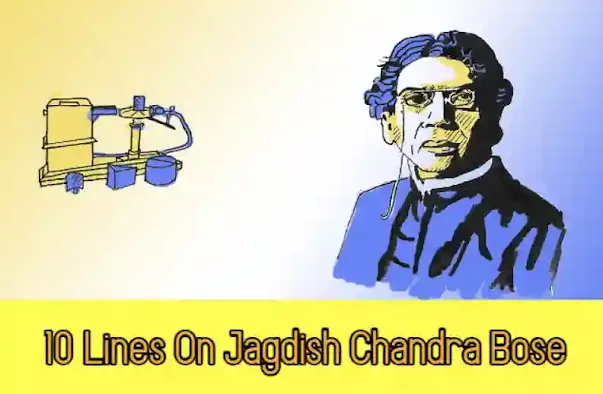10 Lines On Jagdish Chandra Bose for Class 1
1. Jagdish Chandra Bose was a clever scientist who lived in India.
2. He loved to learn about plants and how they grow.
3. Bose was born a long time ago, in 1858, in Bengal.
4. He discovered many interesting things about plants and how they move.
5. Jagdish Chandra Bose invented special instruments to study plants.
6. He showed that plants can feel things, just like people and animals.
7. Bose's discoveries helped people understand plants better.
8. People all over the world liked Bose's ideas about plants.
9. We can learn from Jagdish Chandra Bose to love nature and learn new things every day.
10. His work in science is still remembered and respected today.
10 Lines On Jagdish Chandra Bose for Class 2
1. Jagdish Chandra Bose was a brilliant scientist who was born in Bengal, India, in 1858.
2. He was fascinated by plants and spent his life studying how they grow and move.
3. Bose invented special instruments to study plants, called crescographs, to observe their responses to different stimuli.
4. He discovered that plants have feelings and can respond to touch, light, and sound, just like humans and animals.
5. Bose's experiments showed that plants are living beings that can communicate and feel sensations.
6. He conducted experiments to demonstrate that plants also have a circadian rhythm, like humans, which regulates their growth and behavior.
7. Bose's work revolutionized the field of plant biology and our understanding of plant life.
8. He was also a pioneer in the field of radio and microwave technology and made significant contributions to wireless communication.
9. Jagdish Chandra Bose's discoveries and inventions have had a lasting impact on science and technology.
10. He is remembered as one of India's greatest scientists, whose curiosity and dedication to learning continue to inspire people around the world.
10 Lines On Jagdish Chandra Bose for Class 3
1. Jagdish Chandra Bose was an Indian scientist who lived in the late 19th and early 20th centuries.
2. He was born on November 30, 1858, in Mymensingh, Bengal Presidency (now in Bangladesh).
3. Bose was fascinated by plants from a young age and conducted experiments to learn more about them.
4. He invented the crescograph, a device that could measure the growth of plants and their responses to different stimuli.
5. Bose's experiments showed that plants have a nervous system and can respond to various external factors.
6. He discovered that plants could feel pain, react to light, and even communicate with each other through electrical signals.
7. Bose's research on plants helped scientists understand their behavior and physiology better.
8. In addition to his work on plants, Bose also made significant contributions to the field of radio and microwave technology.
9. His experiments laid the foundation for modern wireless communication technology.
10. Jagdish Chandra Bose's legacy as a pioneering scientist continues to inspire curiosity and innovation in the field of biology and technology.
10 Lines On Jagdish Chandra Bose for Class 4
1. Jagdish Chandra Bose was a renowned Indian scientist born in Bengal in 1858.
2. He was fascinated by the natural world, particularly plants, from a young age.
3. Bose conducted groundbreaking experiments to study the behavior of plants.
4. He invented the crescograph, a device that could measure the growth of plants and their responses to external stimuli.
5. Bose's experiments showed that plants have a nervous system and can respond to various stimuli like light, heat, and touch.
6. He discovered that plants have life processes similar to animals, such as the ability to feel pain.
7. Bose's work revolutionized our understanding of plant physiology and biology.
8. In addition to his work on plants, Bose also made significant contributions to the field of radio and microwave technology.
9. He demonstrated the similarities between living organisms and paved the way for modern biotechnology and communication technology.
10. Jagdish Chandra Bose's legacy as a pioneering scientist continues to inspire generations of researchers and scientists around the world.
10 Lines On Jagdish Chandra Bose for Class 5
1. Jagdish Chandra Bose was an Indian scientist born on November 30, 1858, in Bengal.
2. He was a polymath, excelling in various fields such as physics, biology, and botany.
3. Bose conducted groundbreaking research on plants, demonstrating that they have life processes similar to animals.
4. He invented the crescograph, a device that could measure plant growth and responses to external stimuli.
5. Bose's experiments showed that plants can feel and react to light, heat, and other environmental factors.
6. He discovered that plants have a nervous system and can even communicate with each other through electrical signals.
7. Bose's work helped revolutionize our understanding of plant physiology and paved the way for modern biotechnology.
8. In addition to his work on plants, Bose also made significant contributions to the field of radio and microwave technology.
9. He demonstrated the similarities between living organisms and laid the foundation for wireless communication technology.
10. Jagdish Chandra Bose's legacy as a pioneering scientist continues to inspire curiosity and innovation in the fields of biology and technology.
Also read: 10 Lines On Raja Ram Mohan Roy In English
Also read: 10 Lines On Kindness To Animals In English
Also read: 10 Lines On Lavani Dance In English
Also read: 10 Lines On Thar Desert In English
Also read: 10 Lines On Pratibha Patil In English
Also read: 10 Lines on Kailash Satyarthi in English
THANK YOU SO MUCH




Your blogs are really good and interesting. It is very great and informative. In più è anche senza burro e senza latte e dolcificato con eritritolo il che lo rende adatto anche a chi segue un regime dietetico contract disputes. I got a lots of useful information in your blog. Keeps sharing more useful blogs..
ReplyDelete